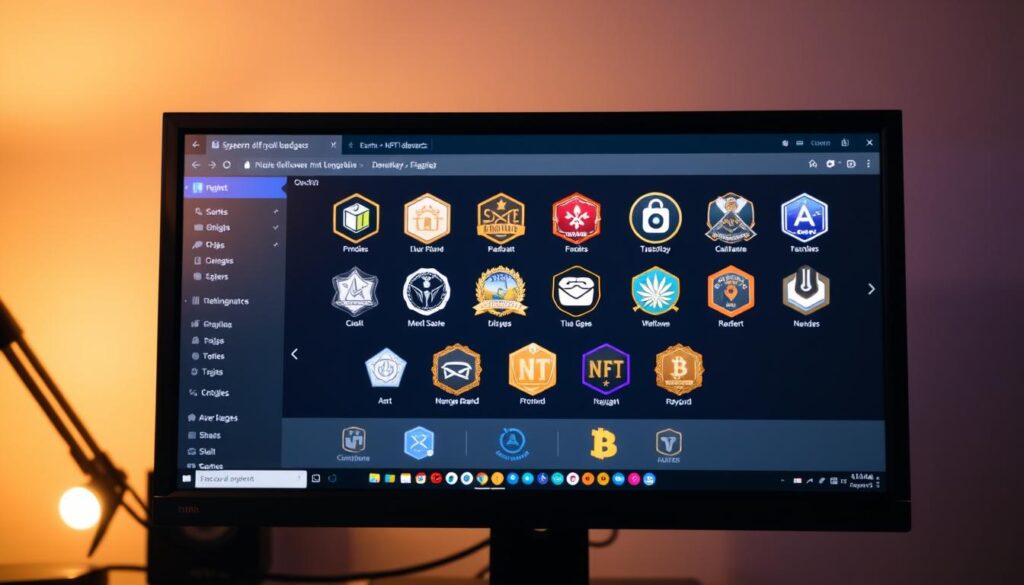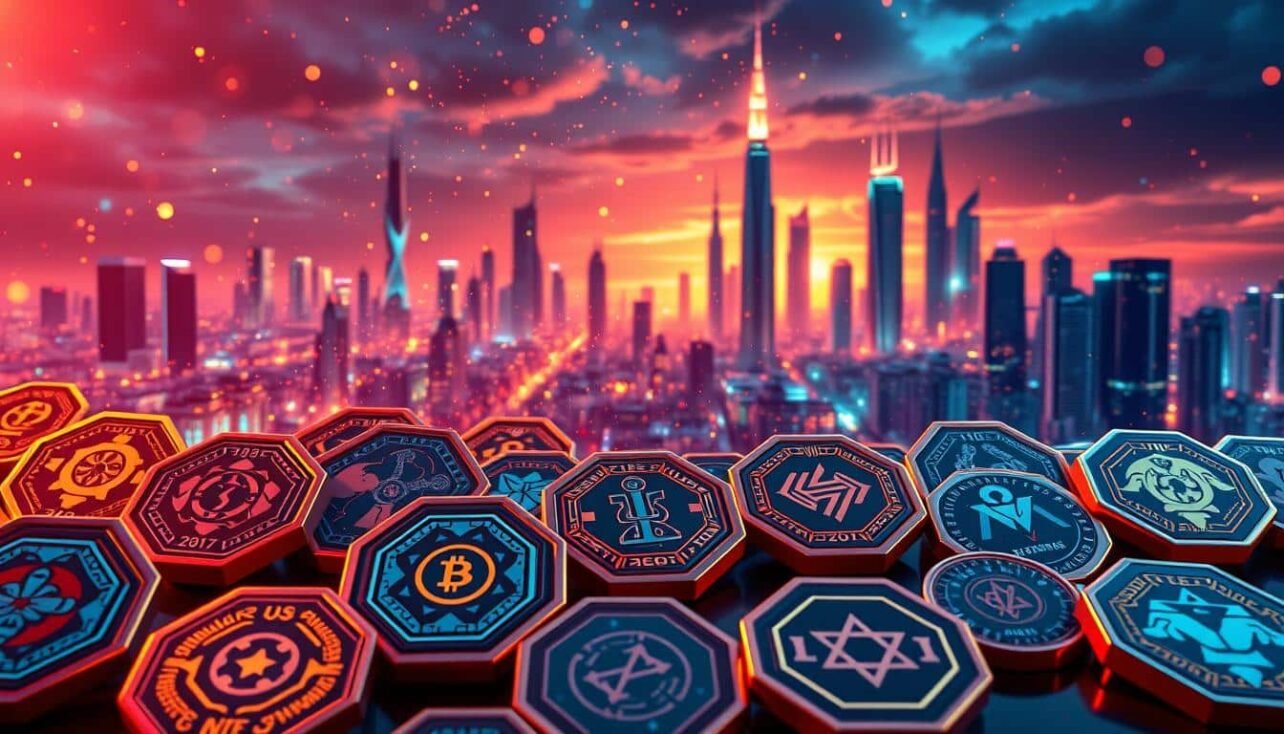The digital world is evolving. New forms of recognition are emerging. These digital credentials are changing how we showcase our skills.
Blockchain technology powers this revolution. It creates permanent, verifiable records of your accomplishments. These records go beyond traditional platform limits.
These collectible digital assets represent important milestones. They prove your participation in various online ecosystems. This creates fresh opportunities for recognition and rewards.
Our guide makes this exciting field accessible. We explain complex ideas in simple language. You will learn from basic concepts to advanced applications.
The benefits are practical and powerful. Your achievements become portable across different platforms. They serve as undeniable proof of your expertise.
This opens doors to exclusive experiences within digital communities. We will show you innovative platforms and real success stories. Get ready to explore a new dimension of online accomplishment.
Key Takeaways
- Digital credentials are transforming how accomplishments are recognized online.
- Blockchain technology provides a permanent, verifiable record of achievements.
- These digital assets represent skills and participation across various ecosystems.
- Benefits include platform portability and proof of expertise.
- They can unlock exclusive experiences within digital communities.
- This guide simplifies complex concepts for all experience levels.
Understanding NFT Badges and Achievements
Blockchain technology has created a new category of digital recognition tools. These credentials represent verified accomplishments across various platforms.
What Are NFT Badges?
These digital tokens serve as permanent records of your accomplishments. Built on blockchain infrastructure, they provide undeniable proof of skills or participation.
Unlike traditional digital badges, these credentials are stored on decentralized networks. This makes them immutable and truly owned by you. Centralized platforms cannot control or remove them.
Technical creation involves standards like ERC-721 on networks such as Polygon. Metadata storage uses solutions like IPFS and Filecoin. This ensures permanent preservation of achievement data.
Two main types exist: non-transferable and transferable badges. Non-transferable versions remain tied to your wallet forever. Transferable ones can be traded as collectible assets.
Digital Achievements Explained
These credentials extend far beyond simple participation trophies. They signal expertise, commitment, and trustworthiness within communities.
The blockchain ensures records cannot be altered or lost. Even if the original platform disappears, your accomplishments remain accessible.
This creates a portable reputation system across different ecosystems. Your verified credentials travel with you beyond individual applications.
Stackable badges allow demonstrating repeated contributions over time. Multiple instances of the same badge type show sustained engagement.
how to earn NFT badges and achievements
Modern platforms have simplified the process of obtaining blockchain-based recognition. These systems transform your existing accomplishments into verifiable digital assets.

Simple Steps for Beginners
Start by setting up a cryptocurrency wallet compatible with major networks. MetaMask works for Ethereum-based systems, while Cardano requires specific wallet applications.
Connect your existing accounts from services like Steam or social media. Platforms such as Badge.ar automatically verify your gaming accomplishments.
Select which milestones you want to immortalize as digital credentials. The minting process creates permanent records on blockchain networks.
Essential Tools and Platforms
Gas-free claiming makes entry accessible for newcomers. Galxe OAT allows email-based collection without transaction fees.
Earning pathways include:
- Community event participation
- Task completion challenges
- Project development contributions
- Gaming platform milestones
Always verify project legitimacy before engaging. Check blockchain credentials and community engagement levels.
Future features will include QR code scanning for instant claims. Notification systems will alert users to new opportunities.
Exploring Blockchain Integration and Community Impact
Digital credentials gain their true power through blockchain’s immutable verification capabilities. This technology creates permanent records that cannot be altered or falsified.

The blockchain foundation ensures each credential’s authenticity is independently verifiable. Anyone can check issuance details, creating transparent ownership chains.
The Role of Blockchain in Authenticity
Blockchain technology prevents forgery and duplicate claims of digital recognition. Each credential links to a specific wallet address with timestamp verification.
This system creates undeniable proof of accomplishments. The decentralized nature means no central authority can revoke earned recognition.
Community Engagement and Decentralized Credentials
Platforms like Kanna demonstrate how blockchain identifies engaged community members. Their system tracks consistent contributions through on-chain activity records.
These credentials serve dual purposes: recognizing individual accomplishments while providing valuable community data. They reveal member expertise and reliability levels.
Decentralized credentials create portable reputations across different platforms. Users maintain verified expertise without rebuilding trust in each new community.
Future applications may include automated rewards based on credential accumulation. Historical achievement data could trigger governance rights or exclusive access opportunities.
Innovative Platforms and Success Stories
Several pioneering services have emerged as leaders in the digital credential space. These platforms demonstrate practical applications of blockchain technology for recognition systems.

Badge.ar: Transforming Trophies into NFTs
Badge.ar bridges traditional gaming accomplishments with blockchain verification. The platform connects to services like Steam, allowing users to mint permanent digital tokens from their gaming milestones.
Using Appwrite backend technology, Badge.ar manages interactions with Cardano blockchain nodes. This creates a decentralized repository for achievement data across different ecosystems.
Kanna and Galxe: Case Studies in Digital Rewards
Kanna offers six distinct credential types with specific purposes. Early Member badges recognize financial supporters with non-transferable tokens. Validator credentials unlock future participation opportunities and audit access.
Galxe OAT simplifies badge creation for event organizers. The platform provides user-friendly tools and gas-less minting. Its open API enables seamless integration with other Web3 applications.
These platforms showcase diverse applications for digital recognition systems. From gaming skills to professional expertise, they create valuable user experiences. The Galxe platform demonstrates how thoughtful design creates effective credential systems.
Conclusion
Portable reputation systems represent the next frontier in personal digital development. These blockchain-based credentials transform temporary accomplishments into permanent, verifiable assets.
The journey from basic setup to claiming digital recognition has become remarkably accessible. Platforms like Badge.ar and Galxe demonstrate practical applications for various interests.
Looking ahead, these systems will continue evolving with new features and integrations. The future holds expanded opportunities for users to showcase their expertise across different ecosystems.
Beyond simple collectibles, these credentials unlock real value through exclusive access and community recognition. Explore NFT membership rewards to discover additional benefits available in digital spaces.
This technology empowers individuals with true ownership of their achievement history. Start building your portable reputation today.
FAQ
What exactly are digital badges?
Digital badges are verifiable credentials that represent skills, accomplishments, or participation. Built on blockchain technology, they are unique tokens that prove ownership and authenticity, making them impossible to counterfeit.
How can I start collecting these credentials?
Begin by exploring platforms like Galxe or Badge.ar. These services connect your wallet to various community events and tasks. Completing specific actions, such as participating in a project’s governance or attending an online event, often rewards you with a new badge.
Why is blockchain important for these achievements?
Blockchain integration ensures that every credential is secure and tamper-proof. It creates a permanent, public record of your accomplishments. This decentralized verification adds significant value and trust to your digital collection.
What is the real-world value of owning these items?
Beyond being collectibles, these assets can unlock exclusive experiences. They often serve as keys to private communities, special airdrops, or voting rights within decentralized organizations. Leaders in the space use them to identify and reward their most engaged users.
Can I trade or sell the badges I earn?
Yes, in most cases. Since they are non-fungible tokens (NFTs), you can typically list them for sale on marketplaces like OpenSea. Their value depends on rarity, the prestige of the issuing platform, and the demand within the community.
Are there any risks involved in pursuing these rewards?
The main risks involve connecting your crypto wallet to new platforms. Always ensure you are interacting with legitimate projects to avoid phishing scams. Additionally, transaction fees on the blockchain are required for minting and transferring these assets.


No comments yet